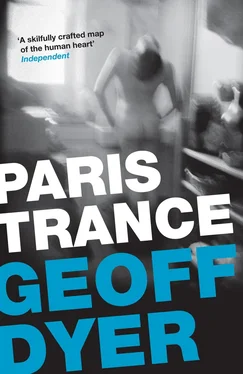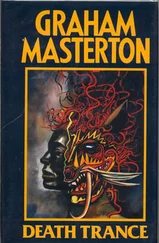Sahra and Nicole liked to play too, in the early evenings. The men played singles and then, when it was cooler, the women turned up for mixed doubles. The games between Luke and Alex were always fiercely competitive but if the match was still under way when Sahra and Nicole arrived the sight of their girlfriends cycling up spurred them on to new heights of aggressiveness. Alex was the stronger and more skilful of the two but Luke ran down every ball, stretching out his thin arms and somehow getting it back. This was both the strength of his game and its fundamental flaw: he loved soaking up punishment but in tennis this proved a less successful strategy than in Ping-Pong. He stood too far back, behind the baseline, putting himself under immediate pressure. What he most enjoyed was chasing lost causes and refusing to accept defeat — but he could never convert this determination not to lose into an ability to win. On the contrary, he had such a dread of losing that it became inevitable that he would. He believed that he was the kind of person who could pull himself back to equal terms from a two-set deficit — and he was, he did. But then, having drawn level at two sets all and gone four games ahead in the fifth, he contrived, somehow, to blow it. He tensed, choked, lost.
After these encounters Luke and Alex came off court and rested while Nicole and Sahra knocked up. They sat on the clay, drenched in sweat, drinking bottles of water, occasionally rolling back a ball that had bounced towards them.
‘I had my chances,’ said Luke.
‘You did.’
‘I didn’t take them.’
‘You didn’t. And do you know why you didn’t take them?’
‘Why?’
‘Because I didn’t let you.’
‘That’s not true. If I hadn’t hit those volleys into the net, I’d have been flying. As it was I was crashing. But if I had made those volleys. .’
‘Do you know what I’d have done then?’
‘What?’
‘Raised my game.’ They laughed and settled back to watch Sahra and Nicole play. Both women had been coached when young, they had the strokes, but both suffered from incredible lapses of concentration that sometimes lasted for the best part of the game. Nicole also got into weird tangles when the ball came straight at her, trying desperately to play a backhand and forehand simultaneously. She had no anticipation, waited for the ball to come at her, made no allowance for spin. After twenty minutes Luke and Alex joined the women on court and they played a set or two of mixed doubles together.
The favourite game of the whole summer, though, was Bombing the Television. Cycling back from tennis they always crossed a small river. From the bridge one evening they saw a television, screen-up, floating downstream.
‘Great,’ said Luke. ‘Let’s smash it up.’ Alex needed no encouragement and immediately they were scurrying around looking for suitable rocks. The TV was ten metres away and was proving difficult to hit. The women joined in and soon were hysterical with delight, desperate to sink it. As the TV drifted nearer it was hit, twice, on the walnut surround but no one could get the screen itself. It floated closer to them but they were running out of decent ammo. Alex was about to propose a cease-fire which would give the TV a sporting chance of survival — no throwing until it had passed a certain distance beyond the far side of the bridge — when Sahra caught it with a direct hit. The screen did not just crack: it exploded, and the TV immediately sank without trace. Nicole and Sahra high-fived each other, weak with the excitement of destruction.
‘It just goes to show,’ said Luke as they clambered back on their bikes like a gang of delinquents, ‘there is nothing in life more pleasurable than destroying things.’
They decided to take a different route home and soon became lost. The sun was slipping behind the remains of a cloud. Trees grew black. Birds were heading home (they could have been heading out but that seemed unlikely). Everything, it seemed, was packing up and heading home, even the clouds: only a few were left. They came to a railway crossing.
‘Let’s walk along the tracks,’ said Sahra.
‘Where do you think they’re going?’
‘In this world there is one path that only you can walk,’ said Luke, echoing Miles. ‘Where does it lead? Don’t ask: take it.’
They locked their bikes together and walked along the railway line, into the embers of the sun. Sahra kept looking behind in case there was a train coming. Alex said there was no chance.
‘How do you know?’
‘Because the rails are rusty, one. And, two, there’s no shit on the tracks.’ He was right but the other three still felt a little uneasy as they stepped across the sleepers. After a point it did not get any darker. Instead, the twilight became more intense. The light faded but the darkness glowed. They followed the rails which kept everything in perspective, lent an automatic purpose to their steps. It seemed possible to walk like this for ever. Then Nicole said she was hungry. The others agreed that they were hungry too, starving in fact. And thirsty. They turned back and walked in two pairs, holding hands.
The rails held what was left of the light. Black against the deepening blue, the last birds dipped by, also in pairs.
If initially it had seemed that there would be nothing to do but relax and read and cook, soon there was too much to do. The days were long but they were not long enough to contain all the happiness we needed to cram into them. How different from now when we have learned to measure out our happiness, distributing it evenly through the week so that there is enough to go round even though happiness is, precisely, an abundance, an overflowing, and even to think about rationing it is to settle for contentment — which anyone who has known real happiness rejects instinctively as the form despair takes in order to render itself bearable.
A few days before Luke’s birthday Nicole came up with another of her Put-Togethers. She retrieved the sunken TV from the river, removed the whole of the back and brought the rest home. For three days she let it dry in the sun and then installed it in the living room which — in order to keep the heat at bay — was kept dark. By placing the screenless walnut surround in front of a window, and blacking out the rest of the window, the TV broadcast a perfect image of the fields and sky outside. It was not just local TV, it was site-specific. The reception was perfect and for Luke’s birthday a customised version of Brief Encounter was being screened.
Luke sat in the darkened living room and watched Nicole and Alex playing Celia Johnson and Trevor Howard; Sahra took all the other roles. Alex was the only one who had seen the film and since he had only a vague recollection of all but a few lines, most of the script was improvised. In some ways Luke thought it an improvement on the original: it was in colour for a start, and the scenery was stunning.
‘It all began quite simply,’ said Nicole in her best English accent, ‘in the refreshment room at Milfordhampton Junction. I was trying to get to Altonhampton but the train had split and I was terribly, terribly lost. I walked out of the refreshment room along the platform when suddenly—’
At that moment Alex kicked a ball at her. ‘Oi,’ he called out. ‘Any chance of a shag, love! You look like you’re dying for it!’
That pretty much set the tone for the whole piece. When Celia said she was upset and confused Trevor passed her a strong joint and suggested she ‘have a toke on that’.
‘Might I?’ said Celia.
‘I’m a bit of an idealist really,’ said Trevor. ‘You see I have this idea that I would like to manufacture enough acid to keep everyone in the world tripped out of their minds for the rest of eternity.’
Читать дальше












